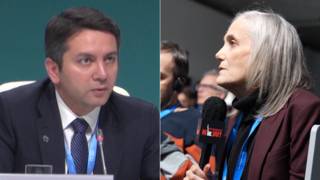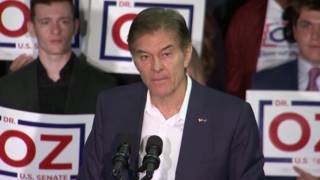
Related
Guests
- Trita Parsifounder and president of the National Iranian American Council. He’s the author of Losing an Enemy: Obama, Iran, and the Triumph of Diplomacy.
- Zaid Jilanistaff reporter at The Intercept.
Vermont independent Senator Bernie Sanders has warned the White House against any attack on Syria without a declaration of war from Congress. On Wednesday, Sanders tweeted, “President Trump has no legal authority for broadening the war in Syria. It is Congress, not the president, who determines whether our country goes to war, and Congress must not abdicate that responsibility.” We speak to Trita Parsi of the National Iranian American Council and The Intercept’s Zaid Jilani, who co-wrote, with Glenn Greenwald, the piece “With Latest Syria Threats, Trump Continues to Be More Confrontational Toward Russia Than Obama Was.”
Transcript
NERMEEN SHAIKH: Trita Parsi, I know you have to go very soon, but before you do, if you could comment very quickly on the escalating situation with Syria, what you expect to happen? I mean, Trump earlier said—he’s gone back on what he said earlier, saying—tweeting this morning, “Never said when an attack on Syria would take place. Could be very soon or not so soon at all!”
TRITA PARSI: This is a tremendously dangerous situation that we have right now, precisely because of the fact that the administration’s strategy seems to only be driven by events, not by any strategic thinking, not by any type of a consideration of what lies in the U.S.’s national interest, combined with the fact that he has no diplomatic component whatsoever. And particularly when you put it in the context that this could actually put the United States in direct confrontation with Russia, then we truly see the tremendous risk for escalation that exists here.
And to have the Pompeo hearing take place in this context, I think, gives a lot of these senators an opportunity to really ask questions of: What is the U.S.'s national interest in this conflict, and how would you pursue it? When you listen to Donald Trump saying that he wants to bring the troops back, but then he also says that, “Well, you know, the Saudis want us to stay, and if they want that, then they should be paying for it,” well, what he's signaling there is that he has no concept of what U.S. national interest is. He’s willing to do things as long as some other country is paying for it, essentially prostituting the American military and turning it into a for-profit venture. That’s a tremendously dangerous approach to take to international relations.
AMY GOODMAN: And, Zaid Jilani, your latest piece, which we’ll link to, “With Latest Syria Threats, Trump Continues to Be More Confrontational Toward Russia Than Obama Was,” if you can talk both about Trump and what Pompeo as secretary of state would mean? Does it matter? I mean, already, Rex Tillerson, of course, having gutted the State Department by something like 30 percent.
ZAID JILANI: Well, it’s interesting. Honestly, if you go back to last year’s confirmation hearings for Rex Tillerson, I think the vast majority of questions were about Russia. I mean, they barely talked about the conflict in Syria, our presence in Afghanistan, the conflict in Yemen, in which the United States is supporting Saudi Arabia. They were overwhelmingly focused on Russia, because there was a perception, as a former sort of oil CEO, that he would be too friendly towards Russia, and, of course, Democrats were angry about the hacking scandal, so on and so forth.
I think, with Pompeo, you know, he has sort of evinced a level of antagonism and hostility towards Russia that I think Capitol Hill probably takes a lot of pleasure in. But I think that the point of the piece that I wrote with Glenn is that if you actually look at the policy the Trump administration has followed, you know, in its first sort of year and a half or year in office, they’ve actually been more antagonistic toward Russia than President Obama was. They went ahead, and they approved lethal arms sales to Ukraine. They have appointed a very anti-Russian U.N. ambassador. And now they’re butting heads in Syria.
And, you know, all of this has very sort of dangerous ramifications for the world. You know, when the United States and Russia escalate, normally, Russians and Americans don’t suffer from it, but other people do. That means people in sort of Ukraine. It means people in Syria. You know, should President Trump escalate in Syria and start attacking the Syrian government—which would be illegal, by the way, without the U.N. and without Congress—but should he do that, I expect that Russia would fully just respond by bombing the rebel-held areas much harder. You know, this is a very sort of dangerous situation.
And I think the point of that article is that people should stop goading the Trump administration to be more anti-Russia. Yes, it’s true that President Trump may have some personal affinity for Vladimir Putin. He also has personal affinity for Netanyahu, for Duterte, for el-Sisi. He seems to like these authoritarian-type personalities. But that doesn’t necessarily mean that the policies he’s pursuing are diplomatic towards those people. They’re actually fairly hostile, and that could lead to a very dangerous situation. And I think Pompeo fits in that, and I think Bolton fits in that. Both of them are much more anti-Russia, I think, than the people that preceded them. And I think that’s a dangerous situation, and people, honestly, should probably stop trying to goad the Trump administration to escalate in that way, because, like I said, the people who ultimately end up suffering for that are people in Syria, are people in Ukraine and other sort of hotspots where the—where U.S. and NATO are butting heads with Russia, whereas, really, they should be coming to terms with each other, and both should be trying to de-escalate rather than escalate.
AMY GOODMAN: Well, Zaid Jilani, we want to thank you for being with us, Zaid Jilani of The Intercept, Trita Parsi of the National Iranian American Council. And, of course, we’ll cover Pompeo’s hearings today on Capitol Hill.
This is Democracy Now! When we come back, the House speaker, Paul Ryan, is resigning, not only leaving as House speaker, but will leave the House of Representatives. He’ll leave at the end of his term. What does this mean for the Republican Party? Does he predict a blue wave? Stay with us.











Media Options